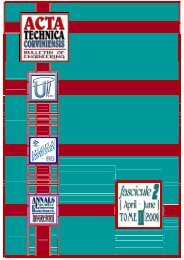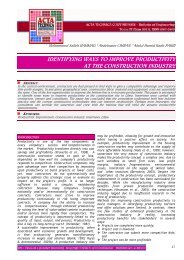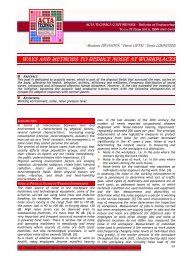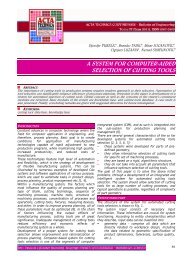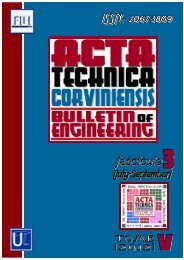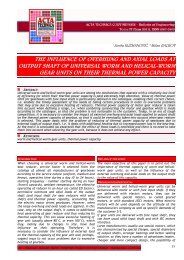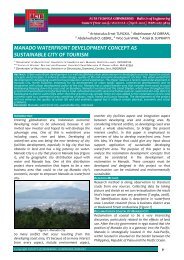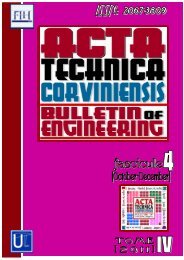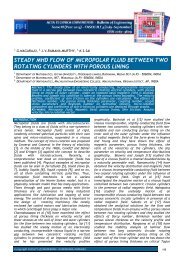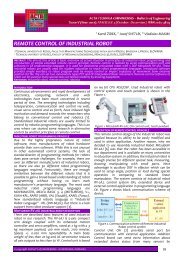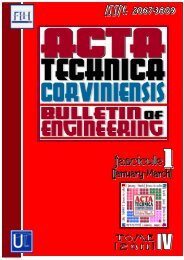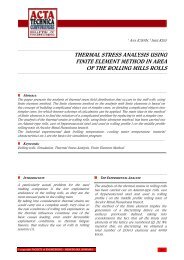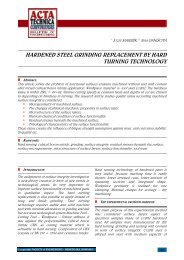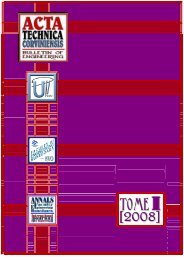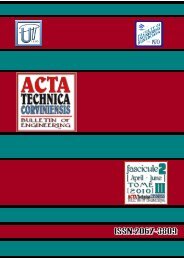a review - Acta Technica Corviniensis
a review - Acta Technica Corviniensis
a review - Acta Technica Corviniensis
You also want an ePaper? Increase the reach of your titles
YUMPU automatically turns print PDFs into web optimized ePapers that Google loves.
ACTA TECHNICA CORVINIENSIS – Bulletin of Engineering<br />
The RCMPSP methodology is mirrored in the rule<br />
determination phase.<br />
Figure 6. The proposed conceptual model<br />
This model, as been previously mentioned, is<br />
materialized by the use of Project Portfolio<br />
Management best practices and delimited by a triple<br />
of resources posed by RCMPSP standardized solution.<br />
Future and further applications and experiments will<br />
empower the proposed method and could aid to the<br />
direction of a more engineering and absolute<br />
resource-related decision making.<br />
CONCLUSIONS<br />
When it’s all been said and done, according to<br />
Project Management experts [19], a project is unique<br />
under the scope of resources, goals, customers,<br />
attitudes, human effort, networking, row of<br />
processes and so on. This explains why Mass<br />
Customization and Project Management are closely<br />
bound together. Thus, by bearing in mind the fact<br />
that customized products are unique by nature, a<br />
common basis for examining them as a united and<br />
solid strategy is formed and provided too.<br />
This papers aims to achieve a “change in the<br />
paradigm”, i.e., imbue Mass Customization with a<br />
renewed logic and an algorithmic viewpoint, to direct<br />
toward a well-known and widely tested technical<br />
approach.<br />
REFERENCES<br />
[1.] M.M. Chatzimichailidou and D. Lukac, “Review<br />
on Living Labs, their predecessors, their<br />
principles and the diversity of their<br />
applications”, International Conference on<br />
Advanced Collaborative Networks, Systems and<br />
Applications, Luxembourg, Luxembourg, 19-24<br />
June, 2011.<br />
[2.] International Project Management Association,<br />
“PM Baseline”, Vers.3.0, PM Austria, 2009,<br />
http://ipma.ch/resources/ipmapublications/ipma-competence-baseline/.<br />
[3.] S.Katsavounis, “Scheduling multiple concurrent<br />
projects using shared resources with allocation<br />
costs and technical constraints”, International<br />
Conference on Telecommunication Technology<br />
and Applications, Damascus, Syria, 7-11 April,<br />
2008.<br />
[4.] Q. Hao, W. Shen, Y. Xue and S. Wang, “Task<br />
network – based project dynamic scheduling and<br />
schedule coordination”, Advanced Engineering<br />
Informatics, Vol.24, 2010, pp. 417-427.<br />
[5.] H. Maylor, “Project Management”, Pearson,<br />
Edinburgh, England, 2010.<br />
[6.] S. Beer, “The Heart of the Enterprise”, Wiley,<br />
Chichester, England, 1979.<br />
[7.] M.M. Chatzimichailidou and S. Katsavounis, “S.<br />
Beer’s Viable System Model application in<br />
furniture industry-a case study”,<br />
Entrepreneurship, Innovation and Regional<br />
Development, Sofia, Bulgaria, 1-2 June, 2012.<br />
[8.] R.G. Cooper, S.J. Scott and E.J. Kleinschmidt,<br />
“New product Portfolio Management: practices<br />
and performance”, Journal of Production<br />
Innovation Management, Vol.16, 1999, pp. 333-<br />
351.<br />
[9.] R.G. Cooper, S.J. Scott and E.J. Kleinschmidt,<br />
“Portfolio Management for new product<br />
development: results of an industry practices<br />
study”, Research & Development Management,<br />
Vol.31, No.4, 2001, pp. 361-380.<br />
[10.] P.M. Berry, B.Y. Choueiry and L. Friha,<br />
“Distributed approach to dynamic resource<br />
management based on temporal influence”,<br />
Intelligent Systems Engineering, Vol.3, No.2,<br />
1994, pp. 79-86.<br />
[11.] J. Brown and B.J. McCarragher, “Maintenance<br />
resource allocation using decentralized cooperative<br />
control”, Information, Decision and<br />
Control, Adelaide, Australia, 8-10 February,<br />
1999.<br />
[12.] P. Brucker, A. Drexl, R. Moehring, K. Neumann<br />
and E. Pesch, “Resource constrained project<br />
scheduling: notation, classification, models and<br />
methods”, European Journal of Operational<br />
Research, Vol.112, 1999, pp. 3-41.<br />
[13.] S. Hartmann and R. Kolisch, “Experimental<br />
evaluation of state-of-the-art heuristics<br />
resource constrained project scheduling<br />
2013. Fascicule 2 [April–June] 69



